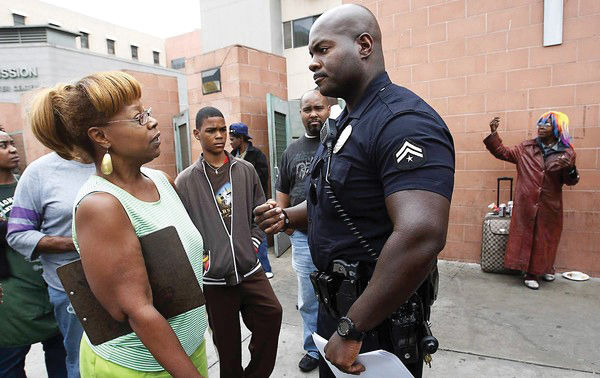When you drive into downtown L.A.’s Skid Row, you feel suddenly and violently cut adrift from all the markers that signal civilization.
I learned of Senior Lead Office Deon Joseph through an article he wrote last August for Downtown News. He sounded human. He responded quickly to my request to talk. I’d come down to the station, we agreed. Always nicer in person.
Joseph is 41, with the stocky build and huge arms of a guy who likes to keep order.
“I was raised in a rough part of Long Beach. My father grew up in the Jim Crow South. He saw his great-grandfather murdered by a 16-year-old who wanted my great-grandfather to walk in the street because he was walking on the sidewalk,” Joseph said.
“He and my mother loved children. They raised four, adopted three, and took in 41 foster children: crack babies, sexual abuse, homeless. My father hired ex-felons. My mother fed the homeless.”
He never wanted to be a cop. “Like many African-American males, I was indoctrinated to hate the police.” But then his father’s contracting business crashed after the Rodney King riots.
When he found he was up for Skid Row, he went home and prayed, “God, don’t send me to that God-forsaken place.”
It was 1997. “My first day, I drove up the 110, got off the freeway. Tall buildings, people in business suits drinking coffee. Thought ‘This ain’t so bad.’ As soon as I crossed over Spring Street, it was like entering ‘Mad Max Thunderdome.’ There were half-naked women running around, men urinating on the sidewalk, tents, bonfires, people with needles hanging out of their arms. Complete and utter lawlessness.”
At the Central Community Police Station at 6th and Wall, he was assigned to the front desk. Great, he thought. Easy. That was before he discovered working the lobby was like working triage in an ER in the developing world.
“We had people coming in with broken arms, lacerated faces. Rape victims. People with their guts hanging out. They didn’t even want to file a report, because of the no-snitch mentality. They just wanted a safe place to wait for the ambulance.”
The force was undermanned and understaffed. A woman Linda, nicknamed “The Hurricane,” would go to the lobby of the police station and destroy it. She was known for spitting in officers’ faces.
The Hurricane took a liking to Officer Joseph. One day she came in, said, “It’s your birthday,” and threw a stuffed Tweety bird on the desk.
“We had a complicated relationship. She called me her brother. Sometimes I could calm her down with a hug or a talk. Sometimes I was forced to arrest her because she was vandalizing the station and have her sent to a mental health facility. I made the mistake, or what I thought was a mistake at the time, of letting her in. I loved her. And then I found out she died on the steps of our station. She froze to death after an overdose of heroin.”
That was when he knew Skid Row was a calling.
“There are two kinds of people on Skid Row: predators and victims. I didn’t hate gang members; I hated what they did.”
For the first seven years, he thought putting away “the bad guys” was the noble way to help, but the justice system didn’t support him. In 2005, he was made senior lead officer. One day, he pulled his cruiser over to the side of Main Street.
“Drug addicts, dealers, screaming, fighting. I’m almost in tears, because I’ve made thousands of arrests and nothing has changed. I’m praying to God, ‘Please help me.’ I had some anointing oil. I poured some into the street,” he said.
“I said a prayer. I closed my eyes for 10 minutes. When I woke up, the predators were gone. I drove around the corner. Three-quarters of them came back. I parked again and stayed for an hour. They left. Drove off again.
“Only a third came back. People were yelling, ‘Ain’t it time for you to go home?’ That’s what I call ‘the sit-down technique.’ I claimed that block and I would not leave. The answer had been in me all the time. He didn’t need me to arrest people, that’s not what was needed. He needed me to be there for people.”
“Being there” for people has sometimes meant arresting the victims, in order to get them off the street so they can’t be hurt. That’s put him at odds with some of the many other good folks who care for the poor of Skid Row: serving food, running rehabs, providing housing and spiritual guidance and medical care.
It would be difficult to feel the weight of Christ’s “The poor you will always have with you” more than they must. To wade in, and to stay — to hold the unresolvable tension, to chip away at the intransigent problems, to work decade after decade within a system that is broken is a small, if not a very large, Resurrection.
If you don’t believe me, drive down there some time. Take a hard, long look around. And let’s see you do it.

